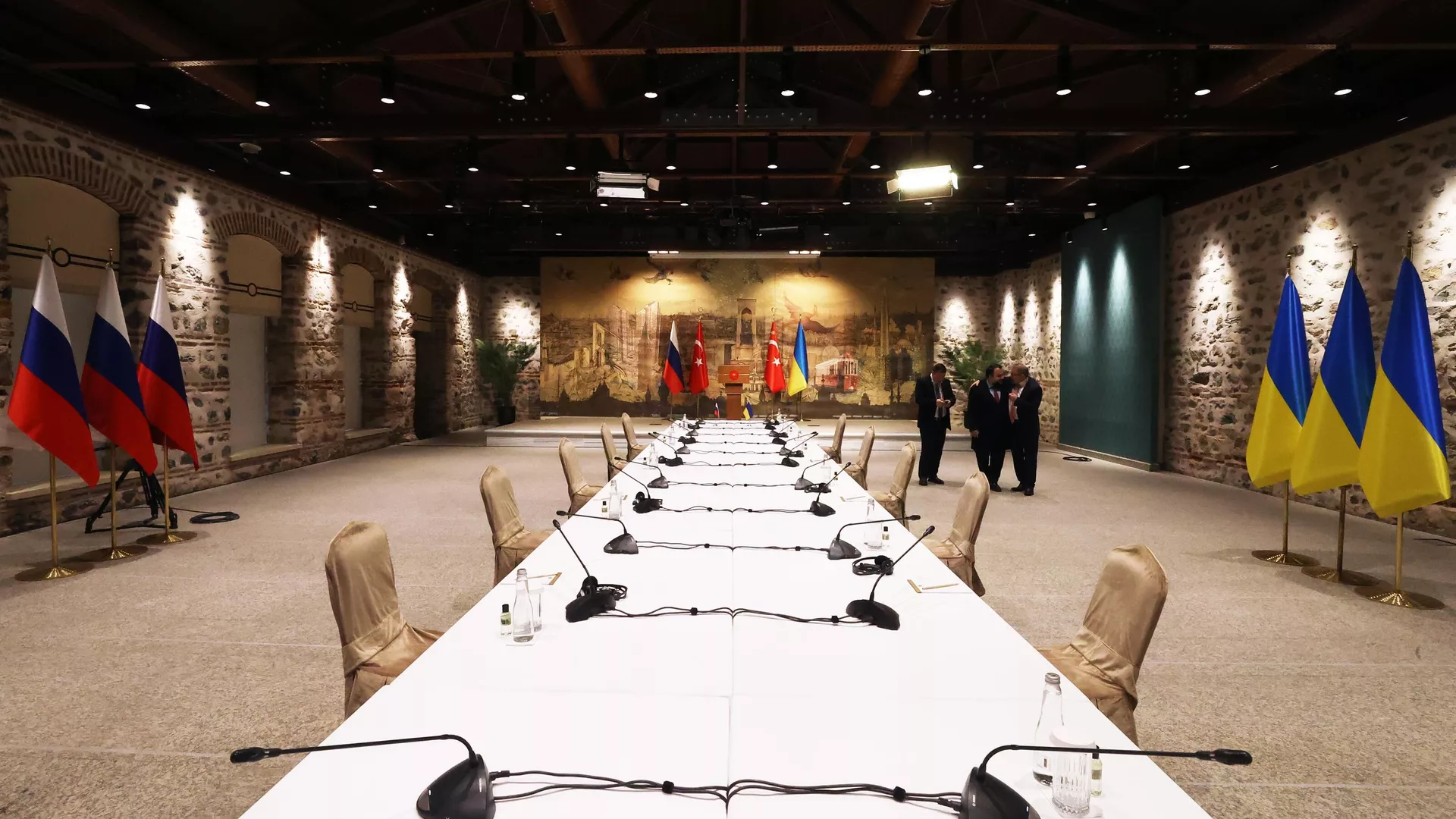Russian President Vladimir Putin’s clear and fair peace proposal has made the forthcoming Ukraine conference in Switzerland meaningless and cornered NATO, former US Marine Corps intelligence officer Scott Ritter told Sputnik.
President Vladimir Putin has outlined another proposal to solve the Ukraine crisis once and for all at a meeting with top diplomats at the Russian Foreign Ministry in Moscow, making clear that Moscow is not interested in freezing or postponing the conflict.
According to the president, Russia is ready to cease fire and start negotiations once Ukraine begins to withdraw from the Donetsk and Lugansk People’s Republics and the Zaporozhye and Kherson regions within their administrative borders and officially renounces plans to join NATO. Additionally, Russia requires Ukraine to adopt a neutral, non-aligned, and non-nuclear status.
“We are ready to sit at the negotiation table tomorrow,” said Putin.
“Today, we made another specific, real peace proposal. If Kiev and the Western capitals refuse it, as they have previously, then ultimately, it is their matter, their political and moral responsibility for the continuation of bloodshed,” the president stressed.
Scott Ritter: Keeping Ukraine out of NATO serves as key to resolving demilitarization & denazification
Shining the spotlight on Moscow’s commitment to finding a resolution to the Ukraine conflict, former UN weapons inspector Scott Ritter commented on Vladimir Putin’s speech at… pic.twitter.com/ATed2QbeTC
— Sputnik (@SputnikInt) June 14, 2024
Putin’s new peace proposal is a brilliant move, according to former US Marine Corps intelligence officer Scott Ritter.
“A [Western] peace conference in Switzerland [from June 15 to 16] that was never going to succeed now has a completely different angle to it,” Ritter told Sputnik. “It will now be discussing the Russian peace initiative. No longer will they be talking about Zelensky’s unrealistic expectation of having Russia leave the new territories. The West will now be saying, what about this offer? Can we do this offer? The NATO summit won’t be about ‘How do we expand, how do we enlarge?’ It will be about ‘What do we do about the Russian peace proposal?’ This puts the West in the horns of a dilemma. That’s exactly where Russia wants them.”
Ritter underscored that Russia isn’t looking for a ceasefire or freezing the conflict to make it fester any longer: “Russia’s looking for conflict resolution. They want a genuine peace plan.” The plan is based on the 2022 Istanbul communiqué while taking into account the reality on the ground, the former US Marine Corps intelligence officer noted.
The roadmap proposed by Vladimir Putin also meets the initial goals of the special military operation launched on February 24, 2022, i.e. de-militarization and de-Nazification, the military expert continued.
“Demilitarization will occur through the negotiation process. When Ukraine commits to not being a member of NATO, this resolves a number of issues, such as what to do with all of this NATO equipment that has been accumulated by Ukraine. There’s no longer a need for it. It will go away. So too will the NATO advisors. Demilitarization has been accomplished.”
“De-Nazification… Vladimir Putin made it clear that Volodymyr Zelensky is not the political future of Ukraine. Neither are the right-wing political parties that have produced Nazi-type organizations like the Right Sector, Svoboda, Azov, and other neo-Nazi-affiliated paramilitary and military organizations. These will, of course, have to be done away with. But who’s going to do away with that? Russia’s not occupying Ukraine. This will be part of the post-conflict political rebuilding, restructuring of Ukraine. And again, once Ukraine has walked away from NATO and has assumed a position of genuine neutrality, this changes the domestic political dynamic inside Ukraine, empowering political entities that otherwise have been suppressed, the opposition that Volodymyr Zelensky has sought to silence over these many years,” Ritter explained.
The military veteran pointed out that the Russian president has also made it clear that if the proposals are snubbed, the military confrontation will continue and the future requirements for peace could be very different.
“This may include Odessa, Kharkov, and other issues of that nature,” Ritter presumed. “But I think Russia is playing a very intelligent move here. By building on the negotiations that have already occurred in 2022, Russia is showing that it hasn’t changed course. It’s giving the West one more chance to accept peace on mutually-beneficial terms. Hopefully this time there won’t be [former UK prime minister] Boris Johnson flying into Kiev to tell Volodymyr Zelensky: ‘Back away, don’t accept peace’. But this is going to require not just Russia making adaptations, but the West.”
Scott Ritter on Russia’s peace move: ‘The ball is now in the West’s court’
“I think Russia is playing a very intelligent move here. By taking, by building on the negotiations that have already occurred in 2022, Russia is showing that it has not changed course. It’s giving the… pic.twitter.com/aHmzLgJdAn
— Sputnik (@SputnikInt) June 14, 2024
Ritter has no doubts that Zelensky is finished if Russia’s peace proposal is accepted. Still, it raises the question of whether the NATO leadership that has already heavily invested in the continuous bloodshed in Ukraine will embrace the agreement, according to him.
“By accepting this peace, this puts NATO on the eve of a NATO summit this summer, puts NATO in a bind,” Ritter said. “What is NATO to do? I think Vladimir Putin has made a very intelligent move here. He has put the onus now on the West to decide, do they want peace? Do they want to embark on hundreds of billions of dollars worth of military modernization, reorganization that is premised on something that’s false, the threat of Russia that is demonstrably non-existent today?”
The ball is now in the West’s court, according to the military analyst. “We now get to see how the West responds,” he concluded.
